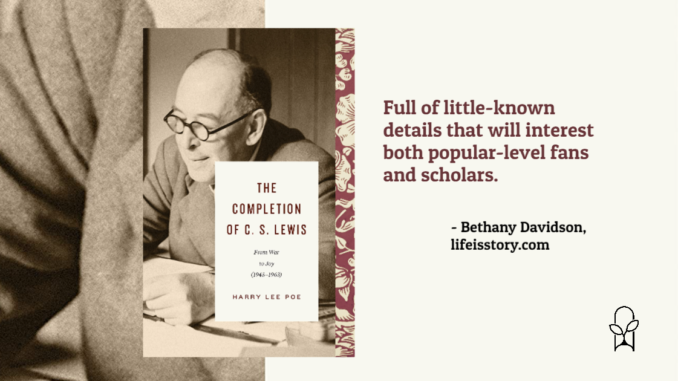
Also by this author: The Making of C. S. Lewis: From Atheist to Apologist (1918-1945)
Series: C. S. Lewis Biographical Trilogy #3
Published by Crossway on October 11, 2022
Genres: Academic, Non-Fiction, Biography, Christian Life, Theology, Writing
Buy on Amazon
Goodreads

Loss and Love in the Final Years of C. S. Lewis's Life
The Completion of C. S. Lewis: From War to Joy is the final volume in a trilogy on C. S. Lewis's life. In this third book, scholar Harry Lee Poe examines the years during World War II until Lewis's death in 1963.
This period of his life was wrought with disappointments and tragedy, including the deaths of close friends and family, the decline of his health, and professional failings. Despite these disappointments, this time was also marked by deep and meaningful relationships with those around him, including his friendship with and marriage to Joy Davidman Gresham. Lewis used these trials and joys to write some of his bestselling books, such as The Chronicles of Narnia; Till We Have Faces; and Surprised by Joy.
Final Book in a Trilogy: Trilogy also includes Becoming C. S. Lewis: A Biography of Young Jack Lewis (1898-1918) and The Making of C. S. Lewis: From Atheist to Apologist (1918-1945)
Examines Lewis's Adult Life from 1945 to 1963: This period of his life greatly influenced some of his most famous books
Appeals to Fans and Scholars of Lewis: Filled with details about the ins and outs of Lewis's life
This in-depth look into C.S. Lewis’s later years is the final volume in a biographical trilogy, and it covers many of the themes and topics that Lewis fans find the most interesting, such as his experiences writing the Narnia books and his controversial marriage to Joy. Harry Lee Poe writes about multiple different threads and themes of Lewis’s life, giving a thorough sense of his home life, friendships, work in academia, popular-level writings, and other topics. The book is somewhat dry in places because of the author’s focus on minutiae, but the writing also sparkles with wry and amusing wit at times, and there are many amusing anecdotes about Lewis in addition to more typical biographical information.
I particularly enjoyed Poe’s treatment of Lewis’s frustrations with Britain’s political situation after the war, and how he overcame his longtime prejudice against Americans as he saw how incredibly generous they were to provide care packages and food parcels when he and his countrymen were subject to extreme rationing and a government that didn’t seem to care about people’s suffering. I laughed out loud at the letter that Lewis sent to one American benefactor, saying that he and the undersigned had thoroughly enjoyed the ham that he had sent. There are a variety of signatures beneath, including Tolkien’s, and I appreciated this biography’s attention to daily life and domestic challenges, not just Lewis’s public persona and work. Poe includes many lesser-known and details such as this, and they greatly enrich the book.
The Completion of C. S. Lewis (1945–1963): From War to Joy will appeal to both popular-level fans and and academics. The book includes many little-known details from Lewis’s correspondence, and the details recorded in letters to and from Lewis and his associates answer common questions and provide rich details. The book will be dry in parts for popular-level fans, and may not be as exceedingly rigorous as some academics would like, but it strikes a solid balance to appeal to both groups. Poe gives a very balanced view overall of various controversies, presenting documentary evidence in favor of his conclusions and explaining why some previous assumptions fall short.
His take on Lewis’s relationship with Joy is very nuanced, clearing her of unjust accusations in some cases while also showing that she did behave in some opportunistic ways. He deals with this in a fair and balanced way, but I wish that he had included a direct mention of Lewis’s and Joy’s marital sexual intimacy. It doesn’t need to be a major focus, but since Poe never specifically mentions this, he could leave a less-informed reader still believing Lewis’s original assessment to Dorothy L. Sayers, in which he believed that “certain problems” would not be relevant for a man of his age and a woman dying of cancer. Lewis and Joy consummated their marriage and enjoyed that part of their relationship once her medical problems improved for a time, and Poe should have included biographically relevant information about this instead of glossing over it.
The Completion of C. S. Lewis is a great book for fans of Lewis who are interested in a well-researched, carefully argued biography about him that relies on primary sources and doesn’t delve into the types of speculation that plague many biographies. The book isn’t perfect, but it is very thorough, nuanced, and filled with interesting anecdotes and little-known details that even I, as someone who has read a great deal about Lewis, did not know at all. I enjoyed this book, and would recommend it to other people who are interested in the details of C.S. Lewis’s life, work, and relationships.
